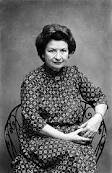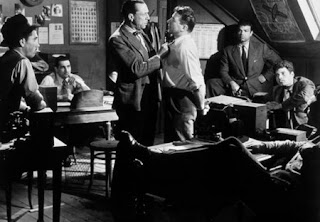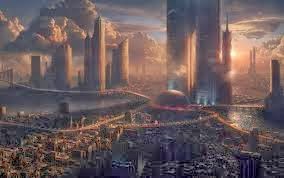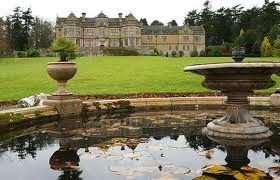Shades of Grey
Jasper Fforde's latest novel is very different to anything he's written before - there's still the same quirkiness, a similar background of a Britain (or somewhere rather like it) stuck in an early 1960's timewarp, and the same humour; but Shades of grey is a much darker novel. If you're new to Jasper Fforde this is definitely NOT the first novel that you should start with, as it's very unrepresentative of the whacky humour and clever playing with literary genres that lovers of the Bookworld and Nursery Crimes series adore. On the other hand if you're into sci-fi, you'll love this, and you'll probably enjoy it even if you didn't "get" Bookworld and Nursery Crimes.
Once I was able to forget that it was Jasper Fforde, so that I didn't have certain expectations, I enjoyed this. It is very dark - it reminded me a lot of both Orwell's Nineteen Eighty-four and A canticle for Leibowitz, which I reviewed earlier this year.
Eddie Russett lives in an ordered post-Apocalyptic society (whatever the nature of the holocaust was it is referred to euphemistically as "The something that happened"). In this society people are ordered by what colours they can see, with people with certain colour visions ranked higher in society than others. Society appears to run smoothly, merits and demerits are awarded within the society, and members are re-booted if they reach a certain number of demerits. Most people appear to be happy in spite of the threat of lightning and swan attacks, and the curse of the mildew.
After a minor infraction Eddie and his father are sent to East Carmine, a town on the outer fringes, where Eddie meets Jane Grey, a rebellious member of the proletariat, and quite different to anyone he has previously met. Through his acquaintance with Jane, Eddie discovers that the world according to Munsell (their god-cum-governor) is not as idyllic as he would like to believe, in fact it is distinctly sinister.
This is a very creepy book with a real undercurrent all the way through it. It does take quite a while to warm up - much of the first half is spent in laying out Fforde's own version of a brave new world, but once it gets going it is very good indeed. I'm looking forward to the rest of this series, as it will be interesting to see where Jasper Fforde goes with this. I suspect that a lot of Fforde fans will not enjoy it, it is a real departure, and I'm not entirely sure how well it will read outside of the UK - there are quite a few references that I suspect will be incomprehensible beyond these shores. Having said which I would certainly recommend it to anyone who enjoys post-apocalyptic sci-fi. It is stunningly readable, and the eeriest book I've read since A canticle for Leibowitz.
Once I was able to forget that it was Jasper Fforde, so that I didn't have certain expectations, I enjoyed this. It is very dark - it reminded me a lot of both Orwell's Nineteen Eighty-four and A canticle for Leibowitz, which I reviewed earlier this year.
Eddie Russett lives in an ordered post-Apocalyptic society (whatever the nature of the holocaust was it is referred to euphemistically as "The something that happened"). In this society people are ordered by what colours they can see, with people with certain colour visions ranked higher in society than others. Society appears to run smoothly, merits and demerits are awarded within the society, and members are re-booted if they reach a certain number of demerits. Most people appear to be happy in spite of the threat of lightning and swan attacks, and the curse of the mildew.
After a minor infraction Eddie and his father are sent to East Carmine, a town on the outer fringes, where Eddie meets Jane Grey, a rebellious member of the proletariat, and quite different to anyone he has previously met. Through his acquaintance with Jane, Eddie discovers that the world according to Munsell (their god-cum-governor) is not as idyllic as he would like to believe, in fact it is distinctly sinister.
This is a very creepy book with a real undercurrent all the way through it. It does take quite a while to warm up - much of the first half is spent in laying out Fforde's own version of a brave new world, but once it gets going it is very good indeed. I'm looking forward to the rest of this series, as it will be interesting to see where Jasper Fforde goes with this. I suspect that a lot of Fforde fans will not enjoy it, it is a real departure, and I'm not entirely sure how well it will read outside of the UK - there are quite a few references that I suspect will be incomprehensible beyond these shores. Having said which I would certainly recommend it to anyone who enjoys post-apocalyptic sci-fi. It is stunningly readable, and the eeriest book I've read since A canticle for Leibowitz.





.jpeg)



Comments